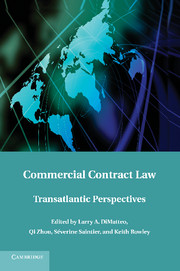Book contents
- Commercial Contract Law
- Commercial Contract Law
- Copyright page
- Dedication
- Brief Contents
- Contents
- Contributors
- Foreword
- Part I The Role of Consent
- Part II Normative Views of Contract
- 5 Naturalistic Contract
- 6 Contract in a Networked World
- 7 Contract Transactions and Equity
- Part III Contract Design and Good Faith
- Part IV Implied Terms and Interpretation
- Part V Policing Contracting Behavior
- Part VI Misrepresentation, Breach, and Remedies
- Part VII Harmonizing Contract Law
- Index
7 - Contract Transactions and Equity
from Part II - Normative Views of Contract
Published online by Cambridge University Press: 05 February 2013
- Commercial Contract Law
- Commercial Contract Law
- Copyright page
- Dedication
- Brief Contents
- Contents
- Contributors
- Foreword
- Part I The Role of Consent
- Part II Normative Views of Contract
- 5 Naturalistic Contract
- 6 Contract in a Networked World
- 7 Contract Transactions and Equity
- Part III Contract Design and Good Faith
- Part IV Implied Terms and Interpretation
- Part V Policing Contracting Behavior
- Part VI Misrepresentation, Breach, and Remedies
- Part VII Harmonizing Contract Law
- Index
Summary
This chapter examines the role equitable principles play in the resolution of commercial disputes and explores the implications for our theoretical understanding of the basis and function of the law of contract. The focus is principally on situations where commercial transactions are dealt with using the principles of equitable trusts and fiduciary relationships. The chapter first discusses how marginal or peripheral contract-like transactions where the parties nonetheless intend to effectuate a commercial transaction, are dealt with by the law through the application of principles of equity. The analysis then looks at how equitable principles manifest themselves in the legal response to transactions that would typically be seen as contractual, and at how parties adopt and use these principles within the overall transactional and contractual framework.
Academic attempts to explain equity’s role in commercial cases have, for the most part, either sought to remove equitable interventions from the transactional framework completely by treating them as a manifestation of property rights or of tort or civil wrongs, or to treat the interposition of equitable principles as being no different from the ordinary contractual response of implying terms in fact or law. It will be argued that these theories do not reflect the factors that judicial decisions use in the application of equitable principles in a transactional context, nor do they explain the range of contextual factors that appear to influence the way equitable principles are actually applied in commercial cases.
A closer examination of the case law shows a strong parallel between these factors and the concerns that have traditionally prompted equitable intervention. As such, the invocation of equitable principles in commercial contexts must be understood as a deliberate departure from the market-rationality basis of the transaction and which is reflected in the law of contract, in favour of a more relational understanding of the transaction. The reasons for this departure – and for its exceptional character – reflect the traditional equitable jurisdiction over fraud and its preoccupation with conscience, and specifically equity’s realisation that the unfettered application of strict rules of law can be destructive of the trust that is necessary for the effective functioning of commercial markets.
The open recognition of the application of equity to police commercial contracts has broader implications for how we understand and theorise about the legal response to problems arising in commercial transactions. Theories of commercial contracting implicitly treat contracts as being the sole legal image of the transaction, and the sole manner in which commercial transactions are reflected or modelled in the law. This chapter suggests that a contract represents one aspect – and only one aspect – of the transaction. Contracts, as the law understands them, are principally, instruments to regulate some aspects of the transaction. Whilst this aspect of the transaction is the one that most commonly comes to the fore in situations where the law intervenes in a commercial dispute, there are situations where other aspects of the transactional relationship assume greater prominence. The consequence is that if we seek to understand how the legal system reacts to the problems created by commercial transactions, the unit of analysis will need to be not the legal conception of the contract, but the broader legal representation of the transactional relationship of which contracts are a part. Correspondingly, theories of contract law must view the law of contract not in isolation, but as a component of the general legal response to the issues created by transactions which deals with one particular type of issue – the party-imposed regulatory framework – and which is embedded in a much broader system.
- Type
- Chapter
- Information
- Commercial Contract LawTransatlantic Perspectives, pp. 146 - 178Publisher: Cambridge University PressPrint publication year: 2013



